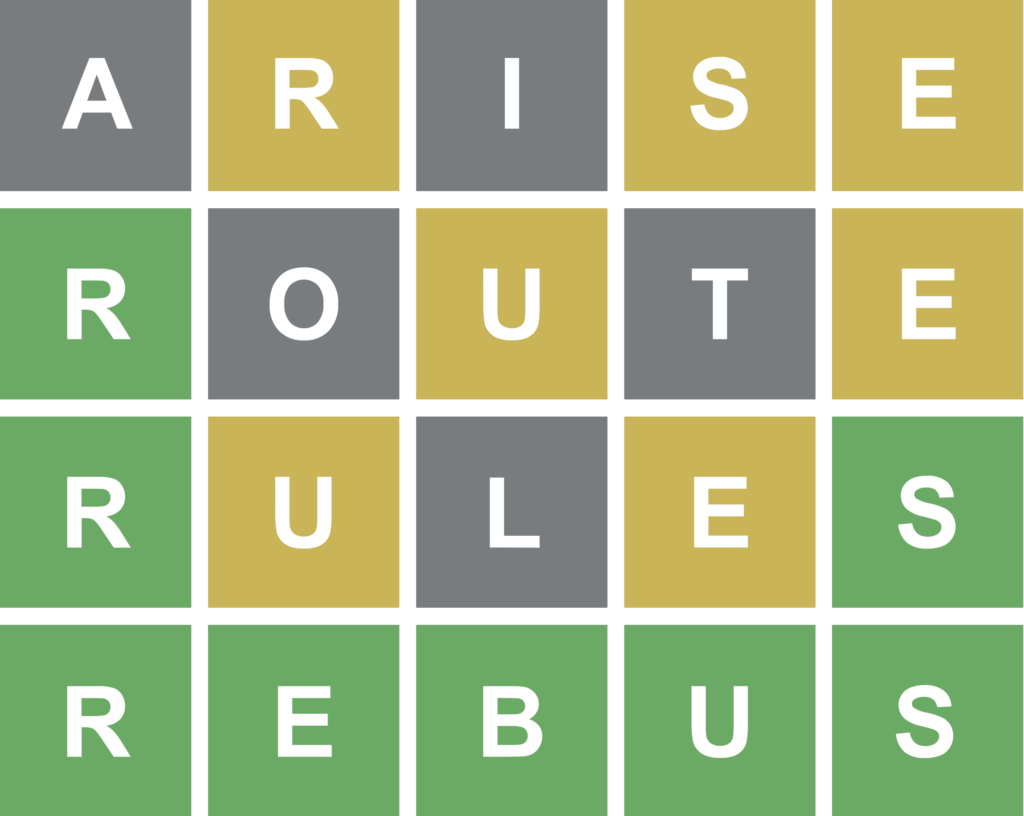I think I’m hooked. I might be an addict?
Everyday I have to do it…
… the Wordle puzzle. You get six attempts at guessing a five letter word. You start with a word of your choice and deduce it from there.
It’s addictive. It was invented by a tech-geek, to entertain his girlfriend, who was big-into-puzzles. The New York Times have, since, purchased the rights for £gazillions.
Addicts, like me, await, breath-bated to see how they’ll commercialise it, collect data and generally ruin it, by monetising it.
You can share your success, or otherwise, on social media. Communities are emerging.
It’s a bit of free fun and there’s not much of that about these days.
Success with a Wordle is like imagining you are running GCHQ, or the Enigma project. Failure is ignominious.
Six goes, with six words… simple. If you like words, you’ll love it.
It got me wondering… we’ve been taking a lot about Boards and eventually you get to the question; just what makes a good Board?
Could it be summed up in six words?
The business of the Board is not the same as the work of the Board. It is the business of the Board to do the work, certainly, but it is also the necessary business of the Board to show the work has been done and how.
If you think about it, the principles are the same ones that makes a great team, an efficient department.
A good anywhere-people-work-together in a joint endeavour. And, just for fun, are there six words that describe excellence?
Six… that crystallise management, shape the world of a team or a board. Six stakes in the ground. Six sign posts. Six words to fall back-on to give us form, direction and purpose.
Here are my six.
1..Imagination: Does the the group have imagination? Is it encouraged? How? If you can imagine it, it can happen.
Imagination is important in problem solving and reversing out of the cul-de-sac… a certain well known Board has got itself into.
Imagination is part of ambition and initiative. If the group can’t imagine solving a problem then, they won’t.
Imagination creates the energy that sparks blue-sky-thinking, that fires-up an idea and blazes its way to a reality and a realisable solution.
2..Inquisitive: people bring their own experience and skills, their qualifications and their knowledge. They also need something else.
A facility to enquire. An ability to look beyond the boundary of their knowledge. Be inquisitive.
The quality of being able to exploit their ignorance and to say;
‘How does it work… what is the purpose, what are we trying to achieve. Explain it to me.’
The most useful quality is ignorance and to be humble enough to exploit it.
Knowing what they don’t know and asking the questions. How, what, where, when, who?
3..Flexibility: the ability to bend and flex and work as a team. Many board members have senior roles elsewhere and often are ‘the boss’ and go unchallenged. Teams have senior people. But…
… hierarchy is corrosive and deference creates sclerosis.
Boards, teams and departments are a joint venture, a single purpose that overrides all other considerations. What is it? In our world, start with the patient and work backwards.
4..Prioritise: the ability to understand what is important and what is not. It is easy to get bogged down in detail but it is just as dangerous to ignore the details and have problems creep-up and overwhelm the group.
Productivity depends on understanding priorities.
The NHSE/I Board have not prioritised workforce and now all recovery plans and developments are in jeopardy and future success, in the balance.
5..Dependable: are the members reliable? Do they turn up, have they read the papers, have they gone out of their way to understand complex issues.
Can you rely on them for their independent judgement?
Do they make a worthwhile contribution or are they passengers?
6..Ambition: However senior, however experienced, we can all improve and develop our skills.
Ambition is the antidote for complacency.
Senior people may think they’ve achieved their ambitions and goals in their own field or sphere of influence. Is this a group with ambition or just big names?
It is important ambition is kindled for the group, the team. Agree what success looks like, focus on it and remind everyone… often.
Those are my six… they’re not set in concrete.
They are based on the experiences I have had working in teams, committees and boards for nearly fifty years.
What are yours?
News and Comment from Roy Lilley
Contact Roy – please use this e-address roy.lilley@nhsmanagers.net
Reproduced at thetrainingnet.com by kind permission of Roy Lilley.
Image by Josh Wardle (website/game), Berrely (vectorizing) – Screenshot of https://www.powerlanguage.co.uk/wordle/, Public Domain, https://commons.wikimedia.org/w/index.php?curid=114049639








